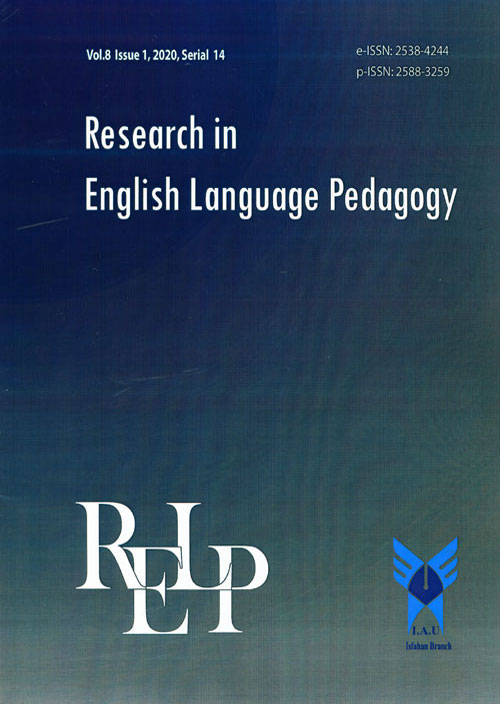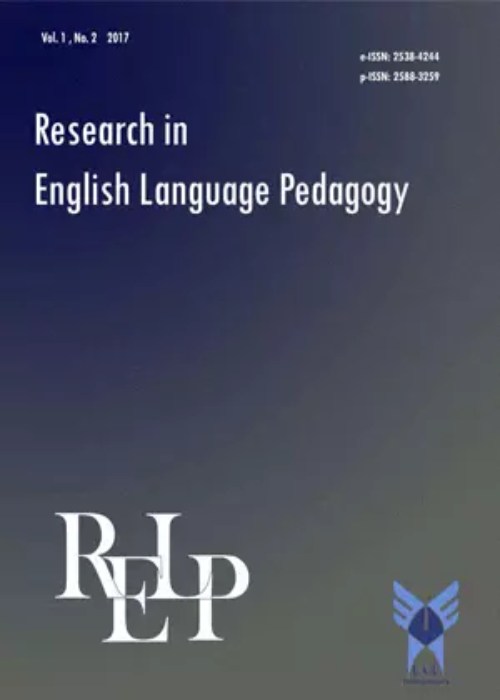فهرست مطالب

Research in English Language Pedagogy
Volume:10 Issue: 2, Spring 2022
- تاریخ انتشار: 1401/02/24
- تعداد عناوین: 8
-
Pages 191-214Qualified human resources are valuable capital for the growth and development of organizations. Among the factors influencing the quality of human resources (e.g. teachers) is Job Burnout. This study aimed at probing the underlying layers of job burnout of the teachers practicing in Iranian private language institutes. To do so, a two-phase design was applied including quantitative and phenomenological qualitative methods. The data were collected through the Maslach Burnout Inventory questionnaire and one-by-one semi-structured interviews. The results of the first stage demonstrated that the participants were moderately burned out. Next, 20 (10 males & 10 females) EFL teachers with at least five years of experience were invited to take part in the interview. After confirming the saturation of data, the researcher analyzed the transcriptions and four main themes, and 16 sub-themes emerged. The results encompassed the definition of burnout, its sources, instances and consequences, and possible strategies to cope with the phenomenon. Private language institute administrators and managers can benefit from the implications of this study by taking due measures like social and emotional support and forming peer support groups to reduce burnout among their employees.Keywords: EFL teachers, job burnout, phenomenology, private language institutes, Peer Support Groups
-
Pages 215-230This qualitative study investigated EFL young learners’ responses to reading activities in reading sessions. It was an attempt to examine students’ responses towards the implementation of individual and collaborative reading activities in teaching reading as a foreign language in reading sessions. To this purpose, 16 Iranian EFL young learners at a primary bilingual school in Tehran together with their English teachers contributed to the study. They were both randomly selected from available teachers and students in Tehran. The learners were around eight years old. The study lasted for 12 weeks. The method used in this study was qualitative. Teachers’ reflective journals, some participant observations, and face-to-face interviews with teachers were the instruments used in this study. The data elicited from the interview transcripts and observations transcription were analyzed inductively. The narrative analysis of interview transcription was coded into themes. The results indicated that collaborative and individual reading activities in reading sessions have a positive effect on young learners’ reading comprehension. Moreover, the students showed noticeable responses to the implementation of collaborative reading activities in reading sessions.Keywords: collaborative learning, Reading activities, reading comprehension, Reflective journals
-
Pages 231-255Over the last two decades, task-based language teaching (TBLT) has been promoted as more effective for language acquisition than conventional communicative pedagogic practices in a variety of literature. However, it is unclear whether TBLT principles are integrated into English as additional language (EAL) teachers’ beliefs and how they made use of ideas announced in the TBLT literature at tertiary level in New Zealand. This exploratory study investigated whether TBLT is evident in three tertiary EAL teachers’ classes and how these teachers used tasks in language classes in New Zealand. Repeated semi-structured interviews and classroom observations were employed in this case study research. A key finding is that teachers were using a Communicative Language Teaching model rather than what they claimed to be TBLT. Furthermore, teachers did not prioritize a particular task feature, which was to have a non-linguistic outcome at the end of the task. This study contributes to our understanding of teachers’ beliefs and practices with regard to TBLT in New Zealand.Keywords: Teachers' beliefs, Task implementation, Education Programme
-
Pages 256-276Consistent with the paradigm shift in language assessment from psychometrics to educational assessment, from an examination culture to an assessment culture, the present study was an attempt to compare and contrast the two forms of speaking assessment: Summative and formative and to see how much consistency existed between the two. To this end, 46 undergraduate Iranian EFL students participated in the study. To achieve the formative assessment, some pedagogic speaking tasks were designed and EFL learners’ speaking abilities were assessed over a three-month period based on pre-determined criteria. As for the summative assessment, a semi-structured interview was conducted at the end of the course, and learners’ performances were assessed by two different raters based on the same criteria. To analyze the data, descriptive statistics, MANOVA, and Pearson correlation were utilized. The results indicated a significant agreement between formative assessment of the first-rater and summative assessment of the second-rater. The findings revealed that from both formative and summative perspectives, pronunciation posed the least challenge whereas coherence and range presented the greatest difficulty to EFL language learners. The study implies that the formative and summative assessment procedures will have to be integrated within classroom settings with more emphasis on the former.Keywords: Summative assessment, coherence, Formative Assessment, Pronunciation, Range
-
Pages 277-300The present study aimed at investigating any significant relationship between EFL learners' L2 Motivational Self System (L2MSS), its components: Ideal L2 self, Ought to L2 self, L2 learning experience and Academic Resilience. The participants of the study included 123 Iranian male and female EFL learners. The instruments were two questionnaires tapping L2MSS and its components and Academic Resilience. The researchers also interviewed 10 participants in an attempt to triangulate the data collection procedure. The results of statistical analysis indicated that there was a significant and positive relationship between EFL learners' L2MSS and Academic Resilience. It also showed that EFL Learners’ L2MSS could be a significant predictor for their Academic Resilience. Nevertheless, there was no significant relationship between EFL learners' Ideal L2 self, Ought to L2 Self, L2 learning Experience and their Academic Resilience. The results of the interviews confirmed the findings of the quantitative phase of the study.Keywords: Ideal L2, L2, learning experience, Ought to L2 Self, resilience, Self
-
Pages 301-320One of the affective factors contributing to the EFL learners’ learning outcome is their preferred language learning strategy. This study aimed to investigate the possible role of E-mind mapping as a modern node-link teaching technique in adopting a specific self-regulated language learning strategy (SRLLS) among Iranian EFL learners. Based on quasi-experimental research, 64 EFL learners were conveniently selected and randomly divided into two groups, namely, experimental and control groups. The valid and reliable Self-Regulated Foreign Language Learning Strategy Questionnaire was conducted for all of the participants in the pre and post-test but with different item orders. The intervention consisted of 15 sessions each 90 minutes in which E-mind mapping was utilized in the experimental group but conventional teaching was employed in the control group. Descriptive statistics and the t-test was used to analyze the collected data. The results revealed that before conducting the study the most preferred SRLLS among participants were cognitive strategy but after using E-mind mapping techniques, the preferred strategy in the experimental group changed to metacognitive strategy. Also, the Iranian EFL learners’ use of meta-effective and meta-sociocultural-interactive strategies, which were previously infrequent, improved. Thus, the results indicated that the E-mind mapping technique was effective in adopting a particular SRLLS among EFL learners. The findings emphasize some successful initiatives to build learners' self-regulated strategies through strategy training incorporated into educational programs and special curriculum designing.Keywords: EFL learning, E-mind mapping, Language learning strategy, self-regulated learning
-
Pages 321-345Research has demonstrated that many factors underlie foreign language classroom anxiety. This correlational study is an attempt to investigate the relationship between foreign language classroom anxiety (FLCA), positive orientation, and perceived teacher and student emotional support among Iranian EFL learners and examine the predictive power of positivity and perceived teacher and student emotional support on FLCA of Iranian EFL learners. To this end, 213 Iranian teenage and adult beginner EFL learners (127 teenagers and 86 adults) filled out the FLCA scale (Horwitz, Horwitz, & Cope, 1986), the positivity scale (Caprara, Alessandri, Trommsdorff, Heikamp, Yamaguchi, & Suzuki, 2012), and the teacher and student emotional support scales (Johnson & Johnson, 1983). Afterward, the researchers examined the correlations among variables, and multiple regression was run to find out the predictive power of positive orientation and perceived teacher and student emotional support on classroom anxiety. The findings revealed that there were significant relationships among all variables. Further, positivity and perceived teacher and student emotional support significantly predicted FLCA levels of Iranian teenage and adult beginner EFL learners. It is noteworthy that EFL teachers require formal training to establish rapport and positive relationships with their students, minimize their FLCA, and create a friendly, supportive, and non-threatening learning environment in their EFL classes in Iranian language schools.Keywords: Foreign Language Classroom Anxiety, Positive Orientation, Student Emotional Support, Teacher Emotional Support
-
Pages 346-368As an effective instructional approach, contemplative teaching has been shown to improve language learning. Nevertheless, its impact on the development of L2 speaking and self-regulation particularly from the perspective of learners has not been examined so far. For this purpose, 62 English as a foreign language (EFL) learners in a language institute in Iran were selected to participate in the study. Participants in the experimental group were exposed to contemplative instruction using the relevant practices, whereas those in the control group received no such instruction. A mixed-methods approach was used in this study for data collection and the obtained data were analyzed through t-tests. The results of statistical analyses failed to demonstrate the effect of the contemplative teaching approach on the speaking skill development of learners. Furthermore, contemplative teaching did not affect the self-regulation behaviors of learners receiving it. And, while learners appreciated some aspects of the contemplative approach, they had concerns about its applicability in teaching speaking. The implications of this study for the teachers who wish to practice contemplative teaching are presented.Keywords: Contemplative approach, Incentives, EFL, Self-regulation, speaking


